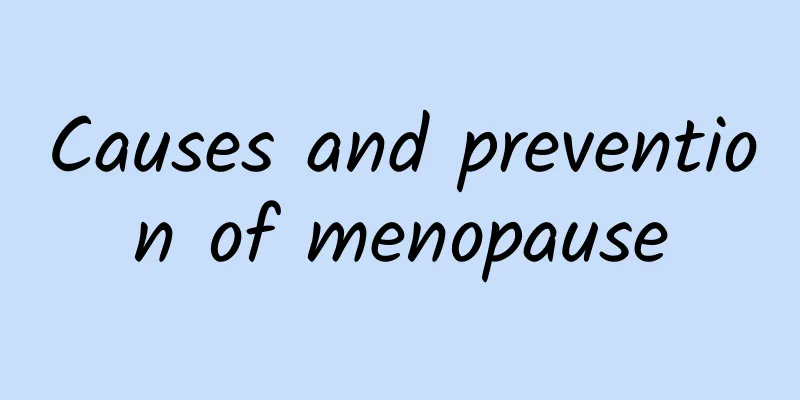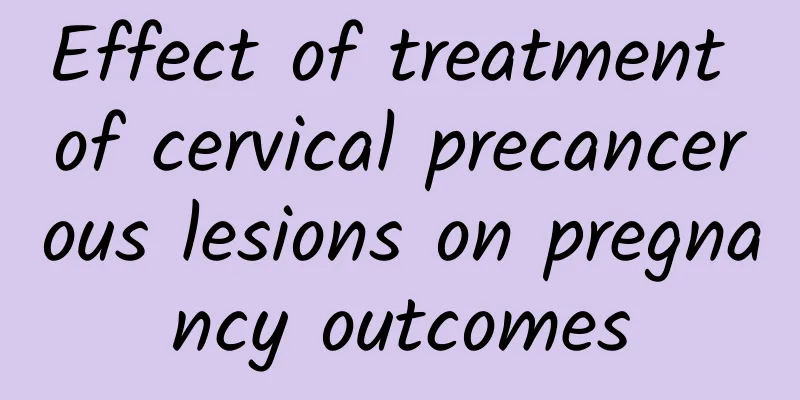Causes and prevention of menopause

|
Women's aging and menopause are inseparable, and because menopause brings many problems, many women are also uneasy about it. Before menopause, women should systematically understand the relevant knowledge, which will help them better get through this transition period. Next, we will introduce the causes and prevention methods of women's menopause. 1. Causes of menopause 1. Pathological conditions, such as severe tuberculosis, severe anemia, malnutrition, etc.; special endocrine pathological conditions, such as "obesity reproductive infertility malnutrition", etc.; damage to certain endocrine glands in the body, such as adrenal glands, thyroid glands, pancreas and other function disorders. Due to the damage of these elements, menstruation often does not come. For amenorrhea caused by these conditions, as long as the pathological conditions are cured, menstruation will come naturally. 2. Atresia of the lower genital tract, vagina, hymen, labia, etc., there is a congenital atresia, or acquired damage to form adhesion atresia. Even if there is menstruation, menstrual blood cannot flow out. This condition is called latent or pseudo-amenorrhea. Atresia of the lower genital tract can be completely cured by the treatment of a good doctor. 2. Prevention of menopause 1. If vaginal bleeding occurs after menopause, it should not be taken lightly. During perimenopause, women experience irregular vaginal bleeding; but after menopause, if you are not using hormone therapy, vaginal bleeding is not normal. At this time, you should go to the hospital for examination in time to find out the cause of the bleeding. 2. After menopause, be alert to the rapid decrease in bone density. Bone loss is most rapid in the first few years after menopause, and osteoporosis occurs when bone loss is faster than normal bone remodeling. Keeping up with physical activity can help keep bones and muscles strong. In addition, to avoid osteoporosis, you should also supplement with calcium and vitamin D. Include enough dairy products and foods rich in calcium in your diet. 3. Urinary system diseases are more likely to occur after menopause. A decrease in estrogen levels in the body can cause the urethra to become shorter and thinner, resulting in some urinary tract diseases, such as frequent and urgent urination; increased nocturia; enuresis when you urgently need to urinate, have sex, or reach orgasm; enuresis when you cough, laugh, sneeze, or lift heavy objects; and a burning sensation when you urinate. If these problems are interfering with your daily life, such as causing you to cut back on physical activity or social activities, it's best to see a doctor. |
<<: Nutrition should be increased to prevent menopause
>>: What are the ways to prevent menopause?
Recommend
It is important to prevent vaginitis in spring
Many women tend to ignore the fact that spring is...
Brief analysis of very typical symptoms of ectopic pregnancy
It is understood that many female friends know th...
What should be paid attention to before the treatment of uterine fibroids? What examinations should be done before the treatment of uterine fibroids?
If a woman suffers from uterine fibroids, she act...
Does women urinate blood after menopause?
If a postmenopausal woman has blood in her urine,...
Is the cost of treating uterine effusion high?
Uterine effusion is a very common gynecological d...
The main cause of vulvar leukoplakia
Among many gynecological diseases, vulvar leukopl...
What are the methods to promote the discharge of residual material from medical abortion?
There are two main types of ovulation promotion. ...
Women's health starts with paying attention to the ovaries
The ovary is an important physiological organ of ...
How to treat leucorrhea that is red and sticky? The cause is quite complicated
If a woman's leucorrhea is red and sticky, th...
What medicine should I take for lower back pain caused by the growth of uterine fibroids? What should I do if I have severe lower back pain caused by uterine fibroids?
Uterine fibroids are a common gynecological disea...
What are the main symptoms of irregular menstruation?
Most women have experienced symptoms of irregular...
Will both biochemical and threatened abortion cause bleeding?
Both biochemical and threatened abortion can caus...
Seeing is believing? Japan invented 'diet glasses' to control appetite
People who try to lose weight or avoid gaining we...
What factors in life can easily lead to dysmenorrhea?
Among the many gynecological diseases, dysmenorrh...
Some dietary considerations for female adnexitis
Clinically, adnexitis can be divided into acute a...









